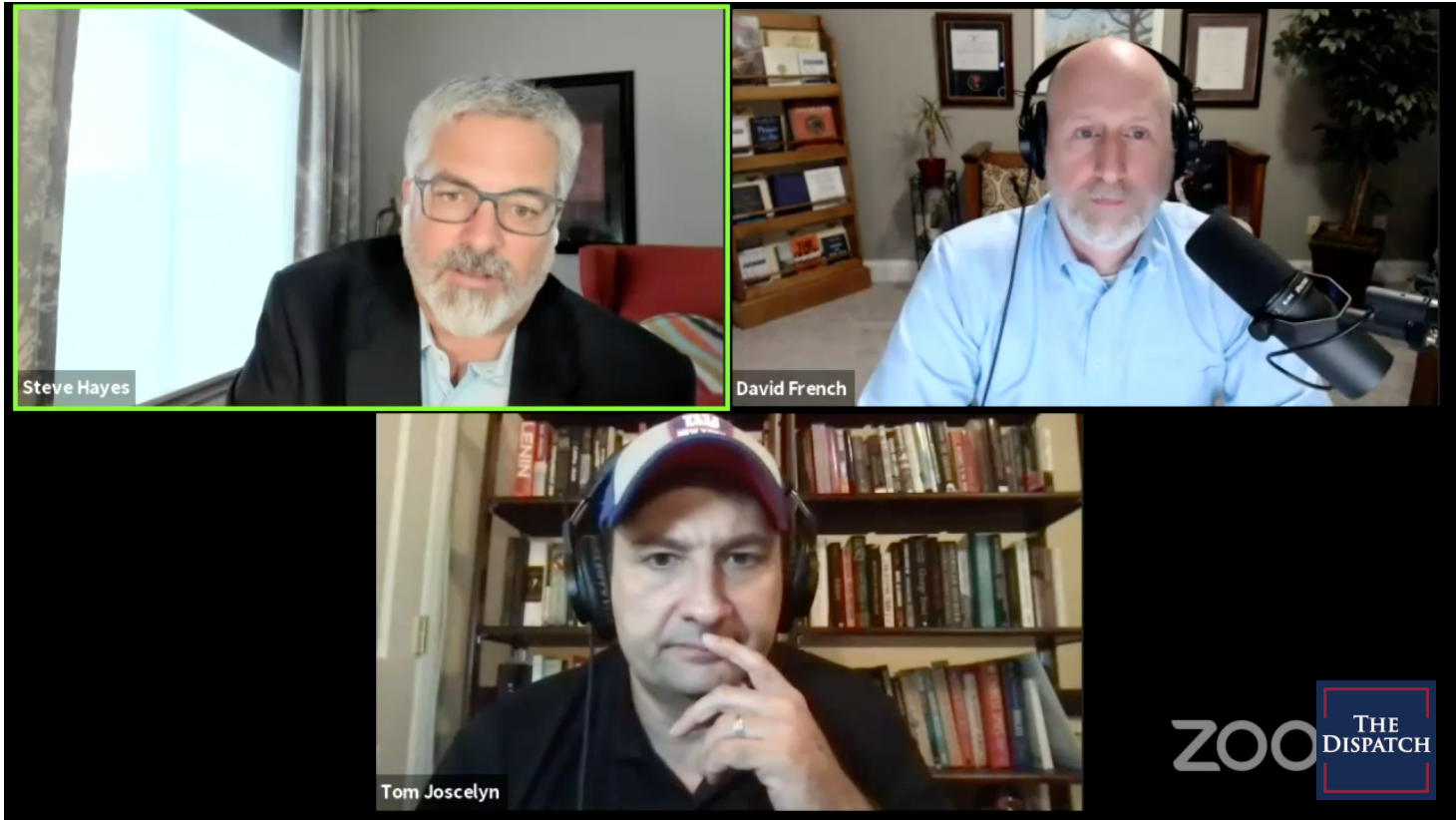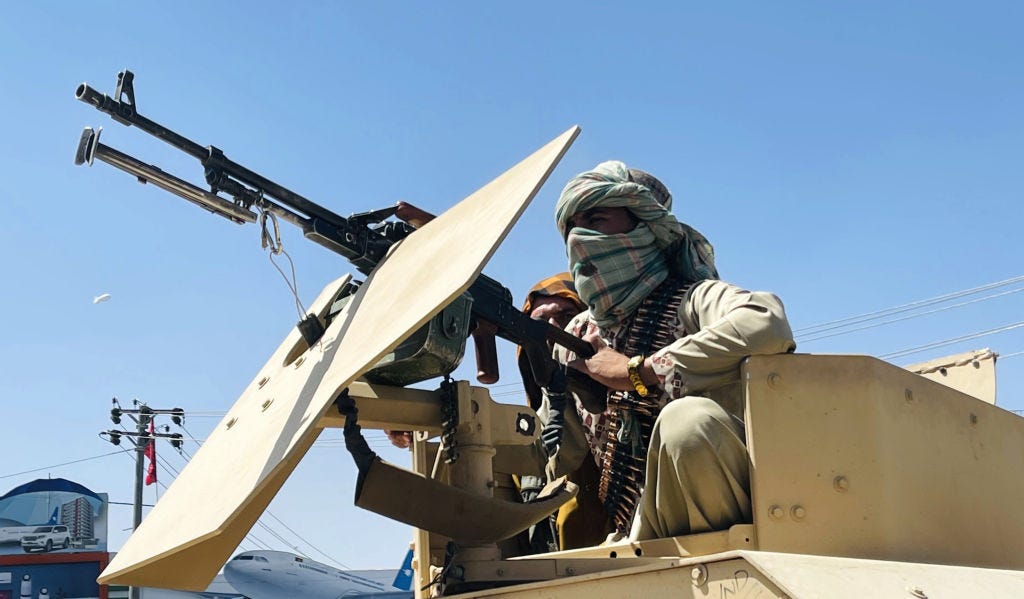I didn’t intend to write about Afghanistan today. But history is being written in real time, and already narratives are emerging that aren’t just wrong, they’re based in fantasies about the history and military reality of post-9/11 America and post-9/11 Afghanistan. The fantasy is simply this—that there was a realistic alternative to America’s invasion and subsequent military presence in Afghanistan that would not have quickly resulted in the Taliban’s triumphant return.
Let me make this concrete. There’s a school of thought that says that there were two potential moments where America could have essentially declared victory and left, with its honor intact. The first moment—argued, for example, in this piece in the American Mind—was after the initial rout of the Taliban and al-Qaeda in the final months of 2001.
Yes, that was an exuberant moment of (partial) triumph. Even at the time, Americans—including American military planners—were aware of Afghanistan’s reputation as the “graveyard of empires.” Many of us had watched the mujahideen grind down the Soviet army. We had every expectation that an American deployment would be hard-fought from day one.
Instead, the Taliban and al-Qaeda collapsed. Local allies, air power, and American “horse soldiers” swatted the Taliban aside and sent Osama bin Laden sprinting to Pakistan. But just as in Iraq 18 months later, surprisingly easy victories can be deceptive. The Taliban wasn’t destroyed. Al-Qaeda wasn’t destroyed. Mullah Omar was alive. Osama bin Laden was alive.
If we left Afghanistan in early 2002, who would have returned to power? In all likelihood, the Taliban, al-Qaeda, Mullah Omar, and Osama bin Laden. The Taliban would have won. That would have been an utterly intolerable outcome to the American people. The purpose of our intervention into Afghanistan wasn’t merely punitive, it was protective. We weren’t simply trying to punish our enemies (like we did when we lobbed cruise missiles at al-Qaeda in 1998), we were trying to inflict such severe damage on them that they couldn’t reasonably hurt us again.
Let’s fast-forward to the second point of possible departure: the months after we killed Osama bin Laden. Here the argument might be more appealing, especially if you buy the false narrative that sharply separates the Taliban and al-Qaeda into two separate entities and two separate fighting forces. The architect of 9/11 was dead, and the Taliban had taken severe battlefield losses during President Obama’s Afghan surge.
Did the United States miss its moment? Once again, I say no. Why? Because in all likelihood the Taliban and al-Qaeda would have won in 2011 or 2012 just as they likely would have won in 2002. Perhaps our evacuations would have been better run, or perhaps the Taliban would have won more slowly, but the bottom line is still the same. From 2001 through 2021, we had to face a singular military fact: The Taliban and their al-Qaeda allies were always Afghanistan’s second-strongest tribe.
They couldn’t defeat NATO, the strongest tribe, but they could defeat the Afghan government. In the final analysis, that’s why we stayed. It wasn’t some sort of military-industrial globalist conspiracy. It was the recognition that at no point in the last two decades was it in the national interests of the United States of America to lose the war, hand control of Afghanistan back to the Taliban, and permit al-Qaeda to establish safe havens.
Well, you might retort, maybe it was acceptable to stay. But did we have to try our hand at nation-building? Did we have to pour so much of our blood and treasure into Afghanistan?
That’s an entirely fair question, but it neglects what I think is perhaps one of the toughest realities of our long war. There was no way to exit absent defeat without engaging in some degree of nation-building. We couldn’t just tear down the Taliban; we had to help build something else up to take its place. And that something we were building—for all its flaws—was far better than the darkness that came before.
Eradicating the Taliban entirely was always going to be a nearly impossible task. As I argued this week in Time, a World War II-style destruction of our enemies was never in the cards. We were fighting an alliance of religious extremists, and so long as the extremism remained, so would the violent expression of its totalizing world view.
Moreover, we were fighting with a tremendous disadvantage. The existence of safe havens in Pakistan made it all the more difficult to deal crippling blows to the Taliban or to al-Qaeda. Defeating an insurgency that has access to territory to rest, recruit, and refit is one of the most difficult of all military challenges.
Thus, the best way to leave without losing (or to render deployments to Afghanistan as peaceful as, say, deployments to Korea) was to make sure that the Taliban were no longer the second-strongest tribe. That was an objective with an end goal, but not a timetable. It was an immensely difficult task made more difficult by the knowledge by all parties that American leadership wasn’t truly committed to the fight.
Nothing I say above should be taken to excuse any of the corruption or incompetence that all too often marred our military efforts in Afghanistan. I highly recommend last night’s Dispatch Live. Tom Joscelyn can (and did) cite chapter and verse of military mistakes.
As I reflected in that same conversation, in my conversations with vets of the Iraq and Afghan wars, Afghan vets tend to be more bitter about their experiences. They’re proud of their service, but time and again they feel that they weren’t deployed intelligently and their critiques were not heard. It’s not a universal sentiment, but it’s always been common enough to give me pause.
There is no question that we could have fought a better and smarter war. But when we debate what happened, we should not let the war’s critics rewrite history. The true argument wasn’t whether we should have “ended” the war sooner. The argument is whether we should have lost the war sooner, and the war’s critics seem to believe that it would be better for the United States if the Taliban and al-Qaeda had triumphed long ago.
One more thing …
In my Sunday newsletter, I made the moral and humanitarian case for protecting Afghans from mass atrocities. This, by Caitlin Flanagan, taking the left to task for its indifference to the plight of Afghan women and girls, is an absolute must-read:
[I]t’s remarkable how quickly the left took up the cold calculus of realpolitik. How quickly it forgot its love for Malala, the young Pakistani girl who survived a Taliban bullet to the head, her only crime getting an education and trying to help other girls get one too. The White House must have known she’d give Biden a bad news cycle or two, and indeed she appealed to the president to take “a bold step” to stave off disaster. You can understand why she thought he would listen. But she’s not a real problem for Biden. You know why? Because she’s something mere: She’s just a woman. She has no army behind her, no treasure, nothing at all to compel anyone to listen except for her matchless authority on the matter and the fact that morally—if not strategically or politically—she is right.
Here’s the fourth cup of tea: In the next few days, another girl foolish enough to think she can keep going to school will take another bullet to the head, and when that happens, the left is going to lose its mind. Dianne Feinstein is going to be very disappointed in the Taliban, and she is going to use America’s voice to give them an earful. Melinda Gates and MacKenzie Scott will go 12 rounds in Madison Square Garden to determine which one of them gets to fund girls’ education in Afghan refugee camps. The winner will fund beautiful schools—air-conditioned, STEM-centered schools. And there might even be time for the winner to private-jet herself to the Aspen Ideas Festival to explain the importance of girls’ education before those schools are blown up, along with the girls inside them.
One last thing …
I really can’t recommend Tom’s comments in last night’s Dispatch Live highly enough. It’s hard to find anyone in the world with more intimate knowledge of the Afghan conflict. His insights were indispensable. Please watch.








Please note that we at The Dispatch hold ourselves, our work, and our commenters to a higher standard than other places on the internet. We welcome comments that foster genuine debate or discussion—including comments critical of us or our work—but responses that include ad hominem attacks on fellow Dispatch members or are intended to stoke fear and anger may be moderated.
With your membership, you only have the ability to comment on The Morning Dispatch articles. Consider upgrading to join the conversation everywhere.